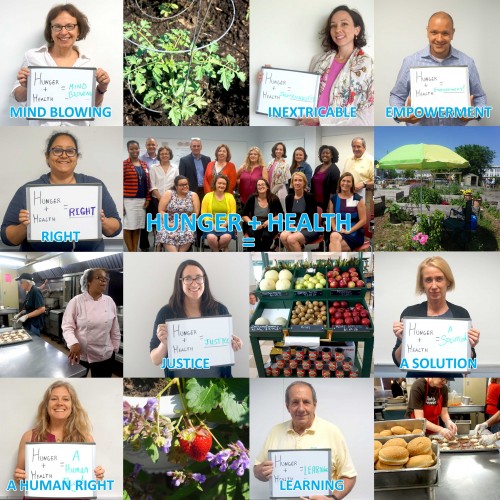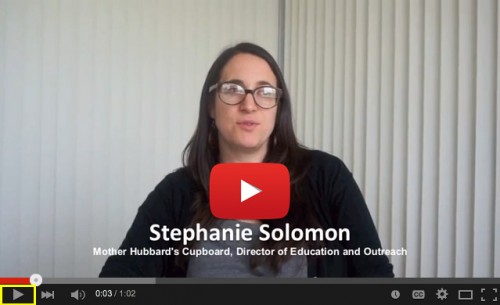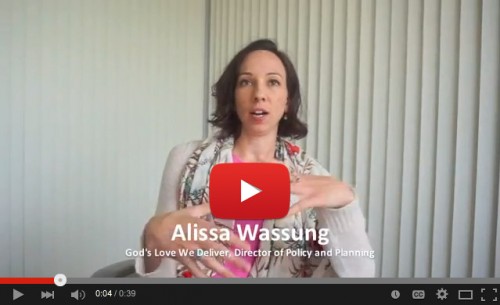 This May, Nourish Network for the Right to Food hosted the 2015 Health and Hunger Summit. WhyHunger sat down with summit participants Stephanie Solomon, Director of Education and Outreach at Mother Hubbard’s Cupboard, and Alyssa Wassung, Director of Policy and Planning at God’s Love We Deliver, to talk about hunger, health, and the right to food.
This May, Nourish Network for the Right to Food hosted the 2015 Health and Hunger Summit. WhyHunger sat down with summit participants Stephanie Solomon, Director of Education and Outreach at Mother Hubbard’s Cupboard, and Alyssa Wassung, Director of Policy and Planning at God’s Love We Deliver, to talk about hunger, health, and the right to food.
WhyHunger: What does the right to food mean to you?
Alyssa: I think that it all goes back to the fact that we share a planet and the planet is a source of food – and by virtue of entering the human race you have a right to part of that planet and to the food it produces and a right to exist in the community of humans. I think that we can easily complicate that – through economics, through access, through demographics – but when you break it down it’s a pretty basic equation.
Stephanie: I was excited to learn about the right to food on this national and international scale. As an organization, Mother Hubbard’s Cupboard has always acted under the idea that everybody regardless of their situation deserves access to healthy food, and then the services bringing food assistance should respect and uphold the dignity of all involved.
WhyHunger: What is the importance of working at the intersection between hunger and health?
Alyssa: Oh I think they’re absolutely inextricable. I don’t think anybody can unweave those two strands, especially when you think of food as just like any other chemical we put into our bodies. For me food is medicine – it’s our most basic medicine, it’s something we medicate ourselves with every day.
Stephanie: I don’t think it’s possible to work in either the hunger movement or in healthcare without addressing the other. That intersection needs to be central to all the work we we do – what we eat, what people are saying today at God’s Love We Deliver – food is medicine. Our health and what we eat or don’t eat impact each other on such a huge scale. So it was nice to be in a space where we were talking frankly about the structures that create more and more challenges between experiencing hunger and having access to quality food – and what that means for your overall health.
WhyHunger: What kind of support does your organization need to continue its work?
Stephanie: Events like this – where we get to come together and talk with other organizations and learn from what they’re doing. A lot of these organizations are addressing health disparities through the food work that they do, in a much more direct way then we are. So it’s really exciting to see what other organizations are doing, and to have this opportunity to network and collaborate… It’s important for us not to be isolated in our own organizations and communities, and to see where there’s room to grow and build health and hunger connections.
WhyHunger: What is the value of coming together at events like today?
Alyssa: It’s been really inspiring to see what other people are doing, and be reminded of why I do this work and why I love it so much and of the opportunities and the challenges we all face together. Overall, my greatest hope for the hunger and health worlds is that they learn how to hold hands. That we’re not separated by fragmented funding streams or our own agendas or our own work in front of our faces, but are able to see how collaboration can improve the safety net we have created and in some ways make sure that people don’t need that safety net – that we change up the structure so that we’re not dealing with the same problems in my daughter’s generation.
For more information, see:
Mother Hubbard’s Cupboard – //mhcfoodpantry.org
God’s Love We Deliver – https://www.glwd.org
Learn more about the Hunger and Health Summit here: //blog.whyhunger.org/2015/07/building-a-community-of-practice-around-hunger-and-health/




